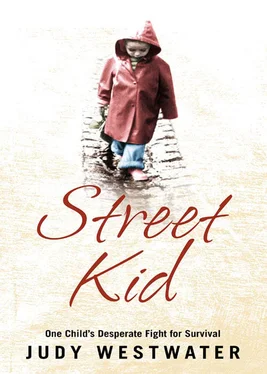I’d never been separated from my sisters before. The trauma of having been left on our own at such an early age had made us terrified of leaving each other’s sides. At night we’d always slept in one bed and during the day we moved about the house like silent triplets or sat on the sofa wrapped in each other’s arms. I think we were frightened one of us might disappear. And now I had.
When we arrived at my father’s place there was a dark-haired woman sitting at the table. Her face was rigid and, although she didn’t say anything, I sensed that she was shocked. I wasn’t really aware of much that first evening as I was almost catatonic with fear, but in the days that followed, I realised from the way she treated me that this sharp-faced woman hated me.
Her name was Freda and she’d left her husband and child for my father. He had promised her the moon and now he here he was, walking in with a two-year-old child in tow and telling her that she had to look after me. It wasn’t surprising she was bitter. All her dreams of starting a new life in their own little love nest, just the two of them, were shattered in that moment.
Things were only to get worse for Freda. The spiritualist union were tipped off by her husband that she was living in sin with one of their preachers, a man who had deserted his wife and three kids and the scandal was soon splashed over the local papers. My dad and Freda were effectively run out of town and we wandered homeless for weeks. No one wanted anything to do with an adulteress who had left her baby.
Finally, we had a lucky break. A friend of Freda’s knew an old couple who needed caretakers for their shop in Patricroft, an old mill town near Manchester. When we went into the shop I thought we’d gone in to buy something. It smelt of sugar and biscuits, and I saw meringues on a shelf by the door. There were newspapers, jars of sweets and cakes, and my stomach gave a rumble as we walked through to the back of the shop. When my father introduced us to the lady behind the counter, she led us through the door behind her and down some stone steps to a room at the back.
Gertie and George Roberts, the owners of the shop, interviewed my dad in the living room of the flat that was to become our home. It had a fireplace and a back door that led out into the yard, a table under the window, a sink in a sort of cubicle, and a tiny two-ring stove.
I’d been cleaned up a bit before the interview, but I expect I must still have looked a sight. My dad was on his best behaviour and laid it on pretty thick, acting the loving family man, trying hard but down on his luck.
‘This is my wife, Freda, and that’s Judy, our daughter.’ I sat on my stool quietly, hearing his lies but not reacting, knowing I’d be severely punished later if I did.
‘You see, I was made redundant from the factory and since then we’ve been struggling to get by.’ His shoulders slumped dramatically.
‘Oh dear me, you poor things. I know it’s been bad for so many just now.’ Gertie’s face was creased with pity and concern.
‘The thing is, I’ve been trying to do my best for them, but it’s been really hard and we’ve got nowhere to go.’
George looked at his wife and cleared his throat. ‘Well, we’d like to help you and you seem like good folk. I know Gertie would agree with me that we’d like the job to go to a family who really needs it.’
‘We’re hard workers,’ said Dad, ‘and we’ll do well for you, I promise you that. We never dreamed we’d be lucky enough to find a job and a roof over our heads too.’
I really felt I had a home now, all because of Auntie Gertie and Uncle George. Uncle George looked like Father Christmas – fat, with a white beard and huge rosy cheeks. He used to sit in the chair while Auntie Gertie helped Freda, and I’d stand against his knees by the fire, happy to be feeling so comfy. I don’t think he spoke much to me, but I liked it that way.
Auntie Gertie was a big-boned woman who looked rather dour; but she was the gentlest person – never aggressive in any way – and had arms that sort of snuggled you. She also helped Freda a lot in the first weeks. I used to watch her mixing the ice-cream by the door of the shop. She gave me a meringue while I sat there with her, which I ate in little bites. She also took us down the steps into the cellar, where she showed Freda how to use the plunger for the washing and the mangle to wring the water out of the wet clothes.
I still missed my sisters terribly and thought of them a lot, especially before I went to sleep at night. I lay on an old settee in the box room upstairs, wondering if they were thinking about me too, and whether Mary wanted to put her arms around me as much as I longed for her to hold me safe and warm.
After the first couple of weeks, once Freda had got the hang of things, Uncle George and Auntie Gertie hardly came round any more. When their dog, Jessie, died they were completely heartbroken and, without the excuse of a walk, didn’t leave their house much. When George and Gertie were around, Freda minded her behaviour and acted the dutiful wife and mother. But now she had the place to herself, things really began to change.
My dad soon got a job in a linen factory, where they made handkerchiefs and eiderdowns. He worked nights as a security guard and slept during the day. I don’t think I ever saw him, unless it was a Sunday. Freda shut me out in the yard as soon as the papers were delivered to the shop in the morning, so I never saw my father come in. And because he was never around, Freda could be as vicious to me as she liked.
In the box room where I slept, there were stacks of boxes all round, making it difficult to get undressed. I didn’t have pyjamas or a nightdress, so I wore my vest in bed and covered myself with a blanket to keep warm. In the morning, as soon as I heard Freda coming out of her room, I would get up and put on my dress and cardigan and go downstairs.
One morning, I came down to find Freda waiting for me. The paperboy had just arrived and she grabbed my arm impatiently and took me to the back door.
Pushing me roughly outside she said, ‘Sit there. I don’t want you moving.’ She pointed to a spot on the paving in the middle of the yard, gave me a vicious little nudge so that I almost fell down the steps, then went back inside.
I walked over to the spot she’d pointed at and sat down. There was nothing to be seen but enclosing grey walls, and a bucket standing against the door of the outdoor toilet. I sat on the cold paving stones wondering when Freda was going to let me in. I remained there for an hour or so, scared to move in case I’d be punished. I remember putting my finger in a crack between the paving stones and moving it along the tiny strip of sand. Then I traced the outline of one of the stones, then another beside it. It wasn’t a very interesting game, but I made it last for a long time.
I’d been told to stay put, but, as I wasn’t wearing any tights or socks, the cold began to get to me. I needed to move about to keep warm, so I stood up and went over to the steps, looking nervously at the back door. I was curious to see what was over the dividing wall, so I climbed up the steps to look into the next yard. I saw it was almost the same as ours, except for a few plants.
I then tried jumping down the steps, one at a time, then climbing up again. I did this at least twenty times, then got bored of it and sat down and looked at the sky. I watched it for ages. I saw the smoke coming out of the chimneys and the patterns it made, and the pigeons on the roofs, hopping about and sitting hunched up in pairs by the chimney pots.
It was several cold hours before Freda opened the back door.
‘Get in,’ she said.
She didn’t even look at me. It was as if she was letting in the dog.
Читать дальше












